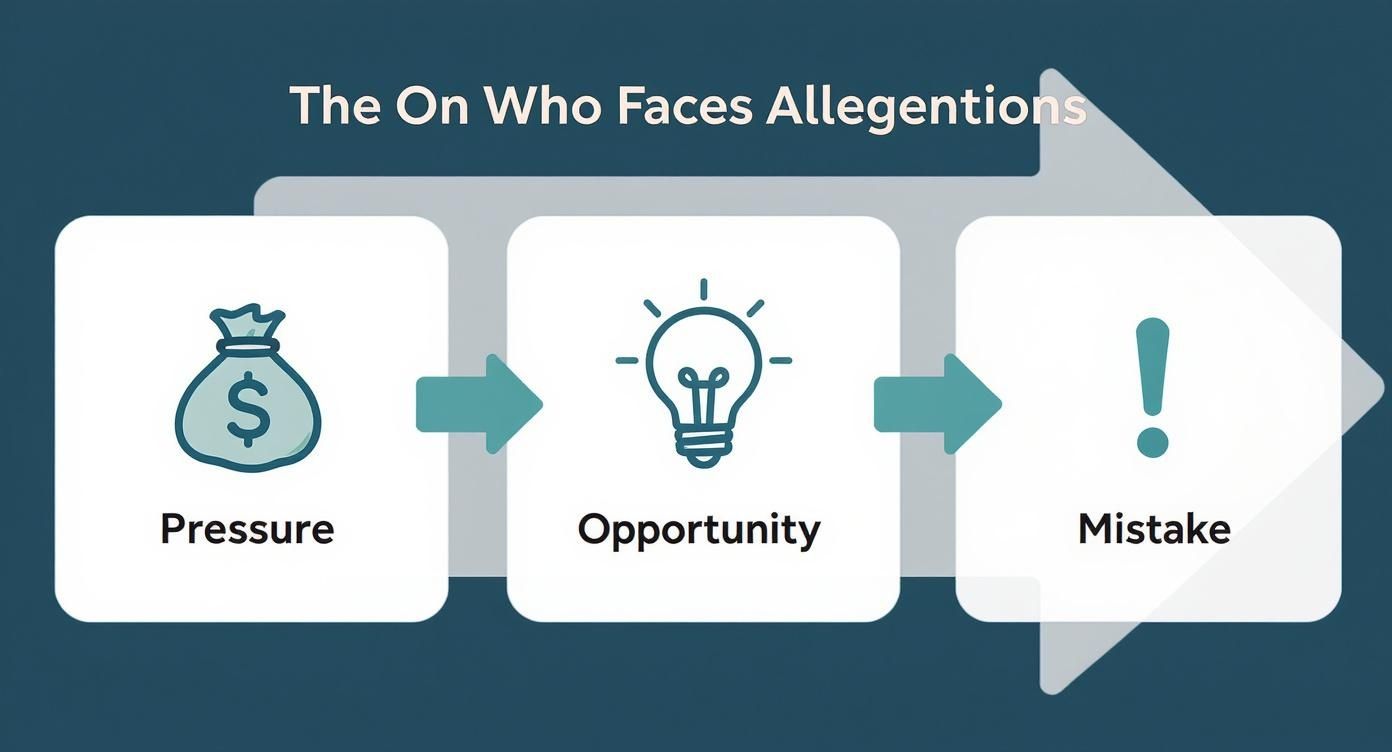Being investigated for a nonviolent financial offense in Texas can feel overwhelming — but you don’t have to face it alone. White collar crime describes financially driven offenses carried out in offices, boardrooms, or government agencies. At its heart, it’s about breaking trust—through lies, concealment, or outright deception—to pad someone’s wallet.
Understanding White Collar Crime

Stepping into a white collar investigation often feels like charting unknown territory. Every email, ledger entry, and meeting note becomes a potential piece of the puzzle—or a trap.
White collar cases hinge on proving intent and financial gain rather than physical harm.
Key Characteristics of White Collar Crime at a Glance
| Characteristic | Description |
|---|---|
| Nonviolent Conduct | No physical force; schemes focus on financial manipulation |
| Deceptive Practices | Misrepresentation or concealment to secure illicit gains |
| Professional Context | Acts occur within corporations, government, or businesses |
These features guide us through fraud, embezzlement, money laundering, and related offenses.
Key Legal Elements
To secure a conviction, prosecutors must demonstrate:
- Intent to Deceive: A deliberate plan to mislead another party for money
- Scheme or Artifice: A structured tactic to defraud under Texas Penal Code Section 32.41
- Proof of Harm: Evidence of actual loss or a substantial risk to assets
According to the U.S. Department of Justice, there were 343 new white-collar crime convictions in January 2025, with “Fraud-Other” accounting for 23% of those cases. For the full breakdown, see the monthly convictions report.
If you’re an investor grappling with financial wrongdoing, understanding what securities litigation entails can point you toward recovery strategies.
Federal agencies—think FBI, SEC, IRS—often lead these probes. They’ll subpoena bank statements, emails, and corporate files to follow the money trail.
Common white collar schemes include:
- Fraud via falsified financial statements
- Embezzlement when a trusted employee diverts company funds
- Money laundering designed to mask the origins of illicit profits
Each allegation ties back to specific sections of the Texas Penal Code, meaning your defense must align with the exact charges you face.
Why Context Matters
In Texas, the severity of charges escalates with the amount involved. Once the alleged loss tops $100,000, prosecutors can pursue a first-degree felony under Texas Penal Code Section 32.46. Understanding where your case falls on this spectrum—and acting fast—can make all the difference between a misdemeanor and life-altering felony exposure.
Common White Collar Offenses In Texas
When someone walks into our office facing white-collar allegations, the first question we ask is: “What exactly are you up against?” In Texas, these cases usually fall into familiar buckets: embezzlement, fraud, money laundering, forgery, identity theft, credit card fraud, and regulatory offenses.
- Embezzlement: Diverting funds you were trusted to manage for your own gain.
- Fraud: Using lies or deceptive tactics to secure money or property.
- Money Laundering: Camouflaging illegal proceeds through a chain of transactions.
- Forgery: Crafting or altering documents to trick another party.
- Identity Theft: Stealing someone’s personal data to benefit yourself.
Comparing Common Texas White Collar Crimes
| Offense | Typical Action | Primary Texas Penal Code Section |
|---|---|---|
| Embezzlement | Diverting funds from employer | 31.03 |
| Fraud | Deceptive billing or false statements | 32.41 |
| Money Laundering | Concealing origins of illicit funds | 34.02 |
| Forgery | Altering or creating documents to defraud | 32.21 |
| Identity Theft | Using another person’s identity without consent | 32.51 |
Embezzlement Charges
Under Section 31.03, prosecutors must prove you intended to deprive the owner of their property. Even small diversions under $2,500 can land you a misdemeanor. Learn more in our guide on the difference between fraud and embezzlement.
Fraud Schemes
Under Section 32.41, the state must show you hatched a plan to defraud and that someone lost—or risked losing—money or property. Examples include healthcare fraud (false billing) and mail fraud.
Money Laundering Charges
Under Section 34.02, prosecutors need to prove you conducted transactions meant to hide illegal profits and reintegrate them into the financial system.
Forgery Charges
Section 32.21 requires proof you knowingly created or altered a document to defraud someone—even a single falsified signature can be felony-level.
Identity Theft Charges
Under Section 32.51, the state must show you impersonated another to obtain property, credit, or services.
Credit Card Fraud
Section 32.31 covers stealing or misusing credit card information—banks and prosecutors trace suspicious spending patterns back to you.
Regulatory Offenses
When false statements sneak into state agency reports or licensing documents, you face regulatory offense charges. From kickbacks to bogus environmental filings, these cases can bring hefty fines and jail time.
Penalties And Consequences
In white-collar cases, the stakes rise with the dollar amount. Many offenses become felonies once losses exceed $2,500 under Title 7 of the Texas Penal Code. First-degree felonies carry between 5 and 99 years in prison and fines up to $10,000.
Key Takeaway
A rock-solid defense zeroes in on challenging the intent and scheme elements prosecutors must prove.
Who Faces White Collar Crime Allegations
Most people assume only career criminals pull off white collar offenses. But executives, managers, and trusted staff at mid-sized firms can find themselves under the microscope. A whistleblower tip or routine review can spark a full-blown investigation. Often, financial strain, a fleeting opportunity, or a simple bookkeeping slip sets off alarms.
- Financial Pressure can push someone toward riskier decisions under stress
- Opportunity appears when internal controls fall short
- Simple Mistakes—like misfiled invoices—can trigger scrutiny
KPMG’s global study shows 81% of offenders are men aged 36 to 55 with over six years at their company. Embezzlement, procurement manipulation, and forged documents top the list. Weak oversight is the main cause, and whistleblowers lead in detection. Read the full research on KPMG.com.
Facing these allegations is overwhelming, but an accusation doesn’t define you. Understanding what drives these cases gives you a head start on your defense.
Navigating The Investigation And Prosecution Process
Nothing prepares you for a subpoena or an unexpected knock on your door. Agencies like the FBI, the SEC, or your local District Attorney’s Office have broad authority to gather evidence.
- Initial Contact: Agents may drop off a subpoena or arrive unannounced.
- Document Review: Investigators comb through records under Texas Code of Criminal Procedure Article 20.01.
- Interviews: Questions often start informally—unless you clearly invoke your right to counsel.
- Grand Jury Referral: A Texas grand jury under Article 19.01 evaluates the evidence and votes on an indictment.
Never let an investigator question you or seize documents before your lawyer is by your side.
How To Handle Investigator Meetings
- Politely decline to speak until your attorney arrives.
- Request a copy of any subpoena or warrant.
- Note names, titles, and agencies of everyone present.
- Alert your white-collar defense attorney immediately.
Early legal guidance under Texas Penal Code Section 39.14 can steer the case in your favor.

Understanding each phase helps you stay in control and avoid costly missteps. Learn more about prosecutorial discretion in our article on what is prosecutorial discretion.
Step-by-Step Guide: What Happens After an Arrest?
Whether you face white collar charges or a DWI, assault, theft, or drug possession, the stages that follow are similar. As your dedicated Texas DWI attorney and Houston criminal lawyer, we guide you through each step.
1. Arrest and Booking
You’re taken into custody, fingerprinted, photographed, and held until bail is set or you post bond.
2. Arraignment (Article 27.02)
At your first appearance, the judge reads charges, ensures you have counsel, and discusses bail. You enter a plea of “guilty” or “not guilty.”
3. Plea Bargaining
Your attorney negotiates with prosecutors for reduced charges or diversion programs—this can avoid a trial and limit penalties.
4. Trial Preparation and Trial
From gathering evidence to lining up expert witnesses (forensic accountants, digital specialists), we build your case. If no deal is reached, we defend you at trial.
5. Sentencing
If you’re convicted or plead guilty, the judge imposes penalties under Texas law. For white collar offenses, this means fines, probation, or prison time based on loss amounts.
Understanding The Penalties And Long-Term Consequences
A conviction for a white-collar crime in Texas goes far beyond a jail sentence. The fallout can affect your career, finances, and reputation.
State Prison Terms And Fines
- Loss under $2,500
• Class A Misdemeanor; up to 1 year in county jail; $4,000 max fine - Loss $2,500–$30,000
• State Jail Felony; 180 days–2 years in state jail; $10,000 max fine - Loss $30,000–$150,000
• 3rd Degree Felony; 2–10 years; $10,000 max fine - Loss $150,000–$300,000
• 2nd Degree Felony; 2–20 years; $10,000 max fine - Loss over $300,000
• 1st Degree Felony; 5–99 years; $10,000 max fine
Across the U.S., businesses lose over $300 billion each year to nonviolent fraud. In 89% of cases, asset misappropriation is the culprit, with median losses of $120,000. Learn more on Zigram.Tech.
Convictions often impact you longer than any prison term.
Collateral Consequences
- Loss of professional licenses (CPA, broker, advisor)
- Difficulty securing loans, housing, or employment
- Stalled career growth and severed business relationships
- Strained family ties and social stigma
- Immigration risks for non-U.S. citizens
Post-Conviction Relief
Texas offers options to clear or seal records:
- Expunction may erase qualifying arrests or charges.
- An Order of Nondisclosure can seal records, limiting public access.
Every case is unique. Consult an attorney to map the best path forward.
How a Defense Attorney Protects Your Rights

A seasoned Texas criminal lawyer safeguards your rights from Day One, setting the tone for your entire case.
Key Defense Strategies
- Attack the prosecution’s case by challenging intent or highlighting honest mistakes.
- Establish authorization when transactions align with your role.
- Negotiate early for dismissals or reduced charges.
- Conduct an independent investigation to uncover exculpatory evidence.
We comb through audit trails, email logs, and contracts to expose inconsistencies.
“A winning strategy starts with dismantling the prosecution’s narrative and protecting your reputation.”
Our team often brings in forensic accountants and technology experts. We leverage our experience in tax audit defense to shield your interests—see our practical guide to tax audit defense.
Need help choosing the right advocate? Check out how to choose a criminal defense attorney for practical tips.
Frequently Asked Questions About White Collar Cases
-
Should I Talk to Investigators If They Contact Me?
Never go it alone. Even a casual remark can be used against you under Texas Penal Code § 39.14. Let your attorney handle every call and meeting. -
Can a White Collar Crime Charge Be Removed from My Record?
Yes—if you qualify for expunction (Art. 55.01) or non-disclosure (Gov’t Code § 411.081). A skilled lawyer will guide you through eligibility and deadlines. -
Do I Really Need a Lawyer If I’m Innocent?
Absolutely. Innocence alone doesn’t make charges vanish. A defense attorney will challenge flawed evidence, file motions to dismiss weak counts, and represent you at every hearing.
“Early legal advice can be the difference between a sealed record and a lasting conviction.”
Steps To Protect Yourself
- Decline interviews until your lawyer is present.
- Preserve emails, invoices, and records.
- Log every contact with investigators.
- Contact a Houston criminal lawyer without delay.
If you’ve been charged with a crime in Texas, call The Law Office of Bryan Fagan, PLLC for a free and confidential consultation. Our defense team is ready to protect your rights.

